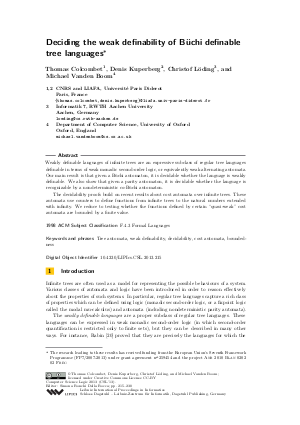Deciding the weak definability of Büchi definable tree languages
Authors Thomas Colcombet, Denis Kuperberg, Christof Löding, Michael Vanden Boom
-
Part of:
Volume:
Computer Science Logic 2013 (CSL 2013)
Part of: Series: Leibniz International Proceedings in Informatics (LIPIcs)
Part of: Conference: Computer Science Logic (CSL) - License:
 Creative Commons Attribution 3.0 Unported license
Creative Commons Attribution 3.0 Unported license
- Publication Date: 2013-09-02
File

PDF
LIPIcs.CSL.2013.215.pdf
- Filesize: 0.51 MB
- 16 pages
Document Identifiers
Subject Classification
Keywords
- Tree automata
- weak definability
- decidability
- cost automata
- boundedness
Metrics
- Access Statistics
-
Total Accesses (updated on a weekly basis)
0PDF Downloads0Metadata Views
Abstract
Weakly definable languages of infinite trees are an expressive subclass of regular tree languages definable in terms of weak monadic second-order logic, or equivalently weak alternating automata. Our main result is that given a Büchi automaton, it is decidable whether the language is weakly definable. We also show that given a parity automaton, it is decidable whether the language is recognizable by a nondeterministic co-Büchi automaton. The decidability proofs build on recent results about cost automata over infinite trees. These automata use counters to define functions from infinite trees to the natural numbers extended with infinity. We reduce to testing whether the functions defined by certain "quasi-weak" cost automata are bounded by a finite value.
Cite As Get BibTex
Thomas Colcombet, Denis Kuperberg, Christof Löding, and Michael Vanden Boom. Deciding the weak definability of Büchi definable tree languages. In Computer Science Logic 2013 (CSL 2013). Leibniz International Proceedings in Informatics (LIPIcs), Volume 23, pp. 215-230, Schloss Dagstuhl – Leibniz-Zentrum für Informatik (2013)
https://doi.org/10.4230/LIPIcs.CSL.2013.215
BibTex
@InProceedings{colcombet_et_al:LIPIcs.CSL.2013.215,
author = {Colcombet, Thomas and Kuperberg, Denis and L\"{o}ding, Christof and Vanden Boom, Michael},
title = {{Deciding the weak definability of B\"{u}chi definable tree languages}},
booktitle = {Computer Science Logic 2013 (CSL 2013)},
pages = {215--230},
series = {Leibniz International Proceedings in Informatics (LIPIcs)},
ISBN = {978-3-939897-60-6},
ISSN = {1868-8969},
year = {2013},
volume = {23},
editor = {Ronchi Della Rocca, Simona},
publisher = {Schloss Dagstuhl -- Leibniz-Zentrum f{\"u}r Informatik},
address = {Dagstuhl, Germany},
URL = {https://drops.dagstuhl.de/entities/document/10.4230/LIPIcs.CSL.2013.215},
URN = {urn:nbn:de:0030-drops-41998},
doi = {10.4230/LIPIcs.CSL.2013.215},
annote = {Keywords: Tree automata, weak definability, decidability, cost automata, boundedness}
}
